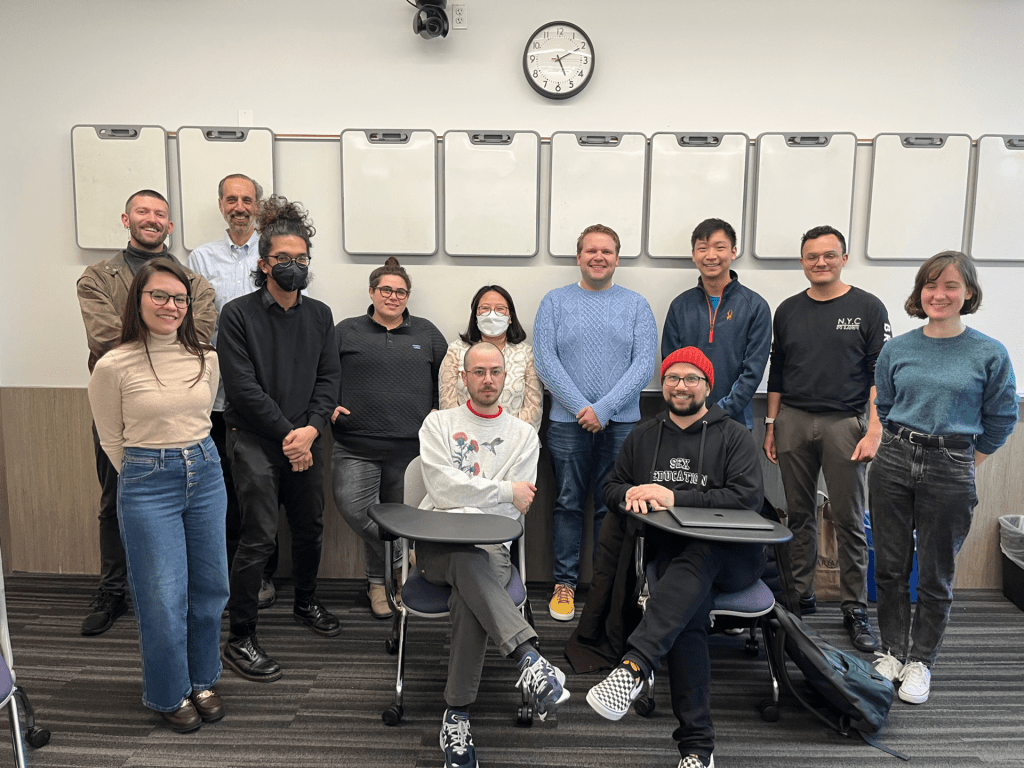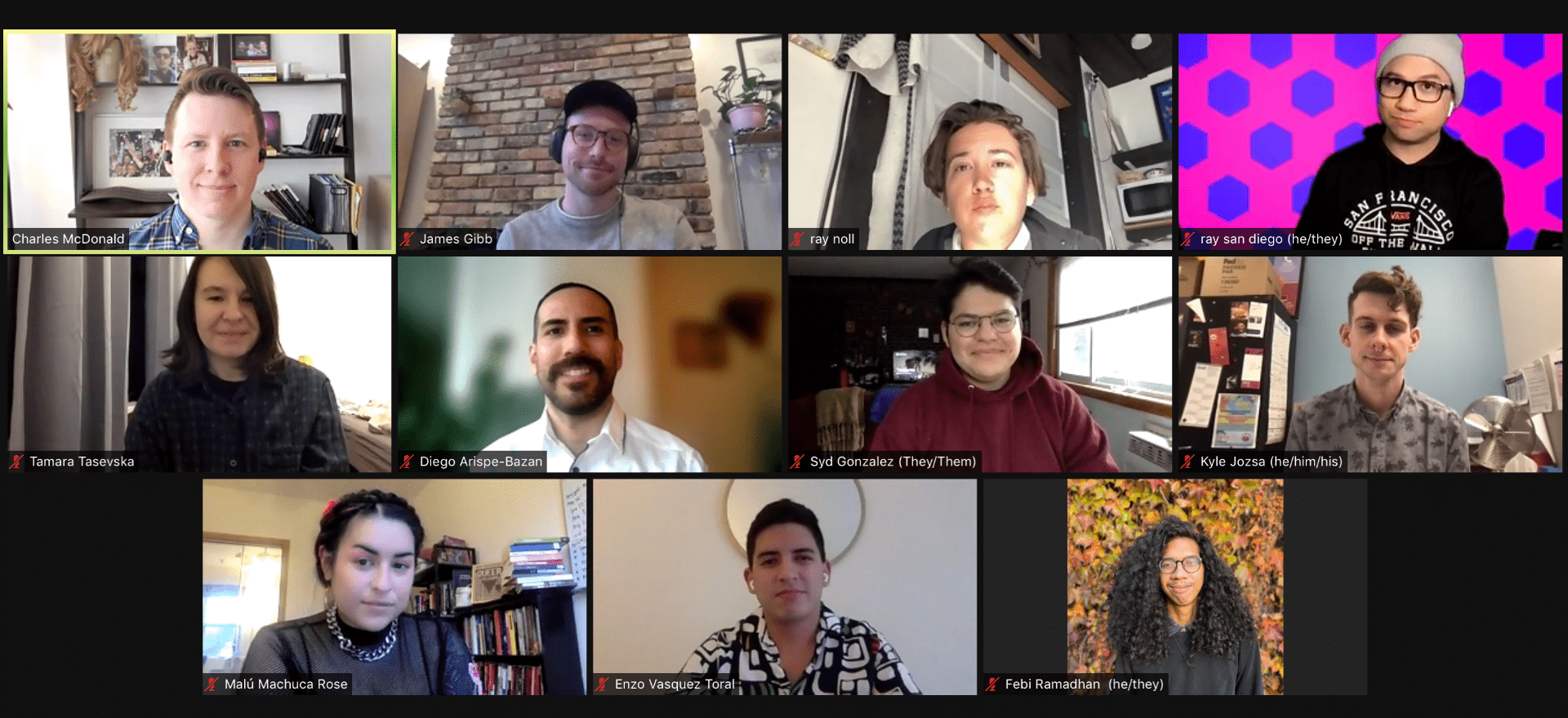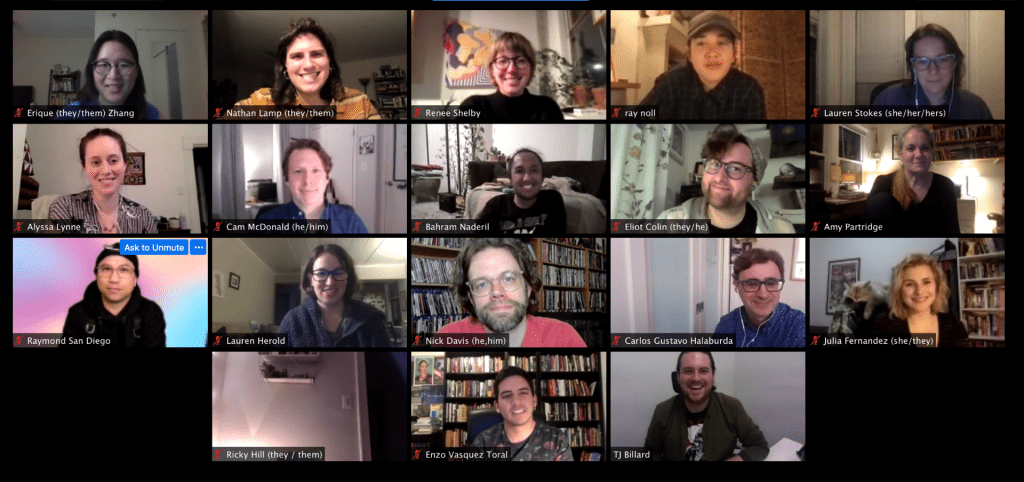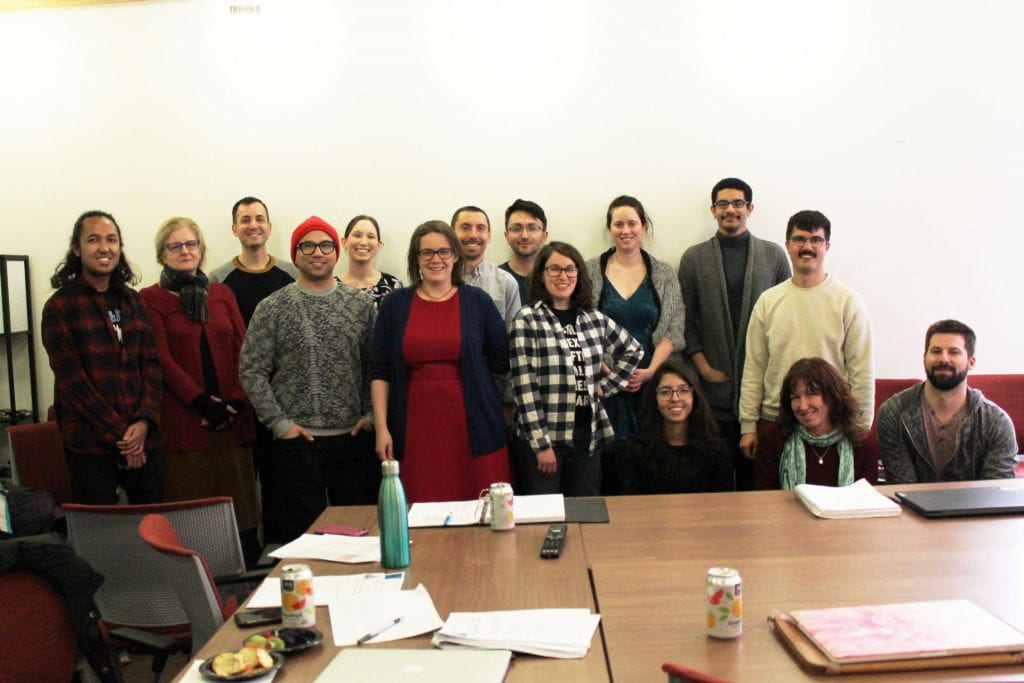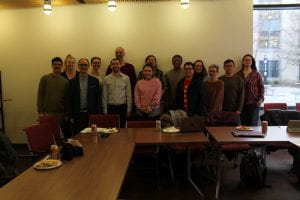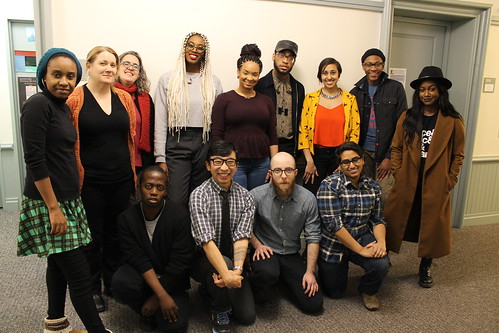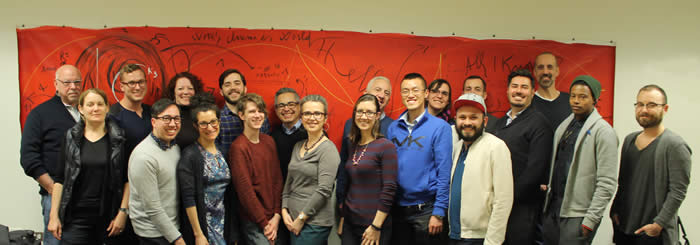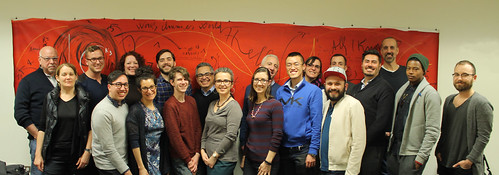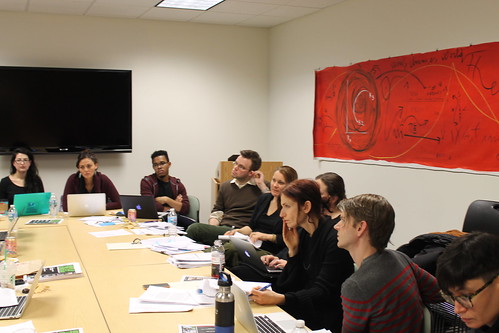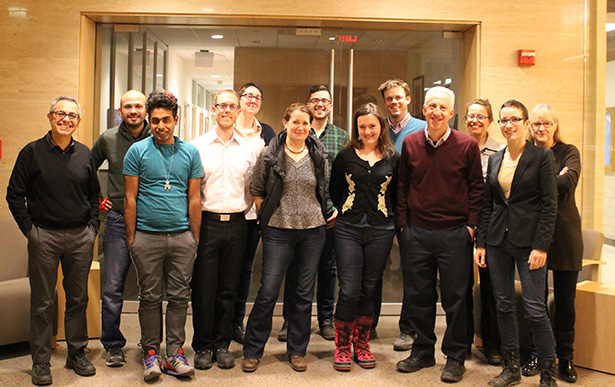The application deadline for participation in the Winter 2024 Reading Group has passed.
Applications are no longer being accepted.
Previous Reading Groups: Winter 2024 | Winter 2023 | Winter 2022 | Winter 2021| Winter 2020 | Winter 2019 | Winter 2018 | Winter 2017 | Winter 2016 | Winter 2015 | Winter 2014 | Winter 2013 | Winter 2012 | Winter 2011
Winter 2024: “Re-Thinking Sex”
Co-Facilitators: Ray San Diego (Asian American Studies) and Ethan Fukuto (Performance Studies)
Reading Group Description:
“The time has come to think about sex,” Gayle Rubin writes in her classic 1984 essay “Thinking Sex,” an invitation to take sex seriously as a distinct node for analyzing power. Forty years later, this SPAN reading group will ask how and if sex has since been rendered more or less thinkable across sexuality studies, queer of color critique, and contemporary language around consent, identity, and queer politics. The Winter 2024 SPAN Reading Group will contend with recent trends in and around queer discourse that de-emphasize if not outright vilify non-normative forms and practices of sex such as kink, fetish play, sex work, and public sex, which echo anti-porn feminist debates that equate sex with violence and gendered or racialized oppression. The readings and viewings will explicitly engage with sex as a centrifugal force and are guided by the following questions: How might sex be imagined more capaciously, and what is the relationship between thinking sex and doing queer politics? What forms of sociality, pleasure, and refusal does sex engender beyond the purview of respectability and normativity?
Preliminary Reading List
Week 1: “Re-thinking Sex”
Gayle Rubin. “Thinking Sex,” (137-181).
Leo Bersani. “The Gay Absence” from Homos, (31-76).
Week 2: Racialized Sexualities
Marlon Bailey. “Black Gay (Raw) Sex,” (239-261).
Vivian L. Huang. “Whither Asian American Lesbian Feminist Thought?” (40-58).
Week 3: Space and Sociality
Liam Wignall. “Pup Play as a Sexual Subculture,” in Kinky in the
Digital Age (160-178).
Margot Weiss. “Beyond Vanilla: Public Politics and Private Selves,” in
Techniques of Pleasure (143-186).
Week 4: Consent
Avgi Saketopoulou.“To Suffer Pleasure: Limit Experience and
Transgression” in Sexuality Beyond Consent (25-55).
Amber Norman. “The Politics of BDSM Play: Racial Dynamics and Critical
Consent,” (219-239).
Week 5: Sex/Work
Juana María Rodríguez. “Women in Public: Biopolitics, Portriture, and
Poetics,” in Puta Life (37-67).
Gwyn Easterbrook-Smith. “OnlyFans as Gig-Economy Work: A Nexus of
Precarity and Stigma,” (252-267).
Participants
| Helen Cho | Faculty | Asian American Studies |
| Gabriel Guzman | Graduate Student | Performance Studies |
| Shamini Kothari | Graduate Student | Comparative Literary Studies |
| Marta Lasota | Graduate Student | Comparative Literary Studies/ Slavic Languages & Literature |
| Heloisa Leite Imada | Graduate Student | Spanish & Portuguese |
| Jonathan Magat | Graduate Student | Performance Studies |
| Ishan Mehandru | Graduate Student | Asian Languages & Cultures / Comparative Literary Studies |
| Jorge Ochoa | Graduate Student | Sociology |
| Febi Ramadhan | Graduate Student | Anthropology / Gender & Sexuality Studies |
| Martha Robinson Rhodes | Postdoc | History / Gender & Sexuality Studies |
| Shira Schwartz | Faculty | Religious Studies |
| Cristian Valenzuela | Graduate Student | Sociology |
| Michal Wilczewski | Faculty | Slavic Languages & Literature |
| Evan Zhao | Graduate Student | Sociology |
Winter 2023: “Global Indigeneities and Sexualities”
Co-Facilitators: Mary Weismantel (Anthropology), Enzo Vasquez Toral (Performance Studies), and Diego Arispe-Bazán (Anthropology)
Reading Group Description:
This year, the SPAN Reading Group will explore Queer Indigenous Studies, a burgeoning new area of inquiry that lies at the intersection of two interrelated fields, Sexuality Studies and Global Indigenous Studies. Despite their disparate origins, the two fields are similar in their attention to both oppression and its opposites: Sexuality Studies in its attention to both normativity and queerness; and Global Indigenous Studies in its attention to the effects of genocidal colonialisms, as well as to the liberatory potential of decoloniality and Indigenous futurities. We will explore similarities and commonalities as well as tensions and frictions between the two fields through a series of targeted readings that explore the space between. We review how in colonial settings, Indigenous forms of kinship, gender, and sexuality constitute(d) a fundamental challenge to Western forms of normativity – a challenge met with harsh, unyielding regimes of repression. Nevertheless, memories and traces of these non-European forms of gender and sexuality, and continuities among Indigenous pasts, present and futures, give rise to a rich history and contemporary flourishing of many different Indigenous genders and sexualities. Of particular relevance is the issue of appropriation: What can we learn from one another, and how should we do it? Readings (and viewings) may include academic writing in history, literature, anthropology, art history and performance studies, as well as works of fiction, art, cinema and performance, according to the interests of the participants.
Participants
| Jillana Enteen | Faculty | Gender & Sexuality Studies |
| Tara Gonsalves | Faculty | Sociology |
| Syd Gonzalez | Graduate Student | Anthropology/Gender & Sexuality Studies |
| Mariana Gutierrez Lowe | Graduate Student | English |
| Michaela Kleber | Faculty | History |
| Zachary Nissen | Faculty | OUSA/Anthropology |
| Katherine Powell | Graduate Student | African American Studies |
| Martha Robinson Rhodes | Postdoc | History/Gender & Sexuality Studies |
| Raymond San Diego | Faculty | Asian American Studies |
| Nitasha Sharma | Faculty | African American Studies/Asian American Studies |
| Angad Singh | Graduate Student | English |
| Marcelo Vinces | Faculty | Molecular Biosciences |
| Cinnamon Williams | Graduate Student | African American Studies |
| Paola Zamperini | Faculty | ALC |
| Evan Zhao | Graduate Student | Sociology |
Readings (organized by session):
Meeting One
Introduction: Indigeneity, sexuality, settler colonialism, decoloniality
- Rifkin, M. (2010). When did Indians become straight?: Kinship, the history of sexuality, and native sovereignty. Oxford University Press.
- Rowe, A. C. (2017). A Queer Indigenous Manifesto. QED: A Journal in GLBTQ Worldmaking, 4(2), 93-99.
- Simpson, L. B. (2017). As we have always done: Indigenous freedom through radical resistance. U of Minnesota Press.
- Tagaq, T. [Tanya Tagaq]. (2021, Sept 28). Tongues [Video]. Youtube. https://www.youtube.com/watch?v=ziaqLa0uinU
- Whitehead, J. (2019). Jonny Appleseed. Mémoire d’encrier.
Meeting Two
Indigeneity and Sexuality as Categories
- Chacaby, M. N. (2016). A two-spirit journey: The autobiography of a lesbian Ojibwa-Cree elder (Vol. 18). Univ. of Manitoba Press.
- Kyrölä, K., & Huuki, T. (2021). Re-imagining a Queer Indigenous Past: Affective Archives and Minor Gestures in the Sámi Documentary Sparrooabbán. JCMS: Journal of Cinema and Media Studies, 60(5), 75-98.
- Mirandé, A. (2016). Hombres mujeres: An indigenous third gender. Men and Masculinities, 19(4), 384-409.
Meeting Three
Indigeneities and Sexualities as Performance
- Avedaño, L. (2019). Taking a Look at Muxeidad. Queer: No. Queer-Po Muxe: Yes. Traducido por Anne Sieberer, Goethe-Institut Mexiko, mayo de.
- Gómez-Barris, M. (2017). 5 Decolonial Gestures. In The Extractive Zone (pp. 110-132). Duke University Press.
- Islas, A. (Producer) & Draper, H. &Islas, A. (Directors). (2006). MUXES: Authentic, Intrepid Seekers of Danger. [Video File].
- Monkman, K. (2012, Feb 4). Miss Chief: Justice of the Piece. Live performance at the Smithsonian’s National Museum of The American Indian.
- Teves, S. N. (2018). Introduction: How to Do Things with Aloha. In Defiant indigeneity: The politics of Hawaiian performance (pp. 1-21). UNC Press Books.
Meeting Four
Indigenous perspectives on sex and gender/ acoloniality, Indigenous pasts and Indigenous futurities
- Benavides, O. H. (2002). The Representation of Guayaquil’s Sexual Past: Historicizing the Enchaquirados. Journal of Latin American Anthropology, 7(1), 68-103.
- Morgensen, S. L. (2011). Spaces between us: Queer settler colonialism and indigenous decolonization. U of Minnesota Press.
- Sigal, P. (2020). Making Maya Men: Fantasy, Voyeurism, and Perverted Penetration. GLQ: A Journal of Lesbian and Gay Studies, 26(1), 1-34.
- Weismantel, M. (2021). Playing with things: Engaging the Moche sex pots. University of Texas Press.
Meeting Five
Indigenous perspectives on sexual violence + RG participant-suggested topics
- Erdrich, L. (2013). The Round House. London: Corsair.
- Florez, C., Hamer, D. & Wilson, J. (Producers) & Hamer, D. & Wilson, J. (Directors). (2014). Kumu Hina. [Video file.]
- Highway, T. (2008). Why Cree is the Sexiest of All Languages. Me Sexy. An Exploration of Native Sex and Sexuality.
Winter 2022: “Queer Nightlife Ecologies: Arts of the Underground in the Era of COVID”
Co-Facilitators: Charles McDonald (Sava Ranisavljevic Postdoctoral Fellow, Department of Spanish and Portuguese and the Crown Family Center for Jewish Studies)
Reading Group Description:
In the U.S. and elsewhere, the past decade witnessed a revival of queer “underground” nightlife organized around electronic dance music, even as other traditional queer urban spaces like bars and large clubs were closing in droves. During the first year of the COVID pandemic, nearly all in-person queer nightlife was extinguished, including bars, clubs, warehouse events, bathhouses, sex parties, and festivals. Already subject to much greater risk of poverty, unemployment, and illness than the general population, queer people who make their living in nightlife (especially trans people and people of color), found themselves in even more precarious circumstances. In the summer of 2021, in-person queer nightlife began to “return,” and along with it the DJs, promoters, producers, performers, dancers, sex workers, bartenders, artists, and music lovers who make-up the underground. This reading group seeks conceptual tools that are adequate for analyzing the forms of labor, care, pleasure, and community that queer communities developed to live through and with COVID. If one aim of the reading group is to track the conditions of possibility for the resurgence of such scenes in recent years, another is to reckon with the ways that their viability is threatened by a virus that is both novel and all too familiar. Over the course of five sessions, we will ask how queer ecologies are produced and sustained, and what flourishes (or doesn’t) within them. Our readings are resolutely interdisciplinary, intended to equip us with theories, methods, and vocabularies with which we might construct a history of queer nightlife’s present.
Readings (organized by session):
Meeting One
Dispatches from the Present I: Death and Resurrection [85pp]
- Campkin, Ben, and Marshall, Laura, “London’s Nocturnal Queer Geographies,” Soundings, vol. 70, no. 70, 2018, pp. 82-96.
- Moore, Madison, “Up in the Club,” in Fabulous: The Rise of the Beautiful Eccentric (New Haven: Yale University Press, 2018), 113-153.
- Reynaldo, Shawn, “Reclaiming the Queer Dance Floor,” National Public Radio, April 12, 2016.
- “The Future of NYC’s Techno Scene,” The Face, October 30, 2019.
- Lee, Steph, “Sex, Techno, Feminism: Inside a New Generation of Queer Parties,” Resident Advisor, June 18, 2019.
- Black, Blair, “The Queer of Color Sound Economy in Electronic Dance Music,” Current Musicology, no. 106, 2020, 9-24.
Meeting Two
Nightlife Methods [85pp]
- Moore, Madison, “Nightlife as Form,” Theater 1 46 (1): 49-63.
- Salkind, Micah E, Do You Remember House? Chicago’s Queer of Color Undergrounds (New York: Oxford University Press, 2019), Introduction.
- Adeyemi, Kemi, Kareem Khubchandani, Ramón H. Rivera-Servera, eds., Queer Nightlife (Ann Arbor: University of Michigan, 2021), Introduction.
- Garcia, Luis-Manuel, “The Queer Concerns of Nightlife Fieldwork,” in Queering the Field: Sounding Out Ethnomusicology, Barz, Gregory, and William Cheng, eds., (New York: Oxford University Press, 2019), 335-352.
- Garcia, Luis-Manuel, “An Alternate History of Sexuality in Club Culture: On the ‘queer roots’ of Disco, House, and Beyond,” Resident Advisor, January 28, 2014.
- Khubchandani, Kareem, “Conclusion. Strangers in the Night: Curating Nightlife at Besharam,” in Ishtyle: Accenting Gay Indian Nightlife (Ann Arbor: University of Michigan Press, 2020), 183-190.
Meeting Three
Bodies, Space, Race [136pp]
- Buckland, Fiona, “Slaves to the Rhythm? Using Music, Space, Composition, and the Ideas of the Body” in Impossible Dance: Club Culture and Queer World-Making (Middletown: Wesleyan University Press, 2002), 65-85.
- Bailey, Marlon M., “‘It’s Gonna Get Severe Up in Here’: Ball Events, Ritualized Performance, and Black Queer Space,” in Butch Queens Up in Pumps: Gender, Performance, and Ballroom Culture in Detroit (Ann Arbor: University of Michigan, 2013), 124-181.
- Livermon, Xavier, “Soweto Nights: Making Black Queer Space in Post-Apartheid South Africa,” Gender, Place and Culture: A Journal of Feminist Geography, vol. 21, no. 4, 2013, pp. 508-525.
- Salkind, Micah E, “Are You Ready to Get Your Life? Performing Neostalgia and Wildness in Chicago’s Contemporary Queer Club Scenes,” in Do You Remember House? Chicago’s Queer of Color Undergrounds (New York: Oxford University Press, 2019).
- Adeyemi, Kemi, “The Practice of Slowness: Black Queer Women and the Right to the City,” GLQ: A Journal of Lesbian and Gay Studies vol. 25 no. 4 (October 2019): 545-567.
Meeting Four
Attunements: Pleasure, Community, Utopia [142pp]
- Buckland, Fiona, “The Order of Play: Choreographing Queer Politics,” in Impossible Dance: Club Culture and Queer World-Making (Middletown: Wesleyan University Press, 2002), 86-110.
- Race, Kane, “Queer Chemistry: Gay Partying and Collective Innovations in Care,” in The Gay Science: Intimate Experiments with the Problem of HIV (New York: Routledge, 2018), 25-45.
- Orne, Jason, Boystown: Sex & Community in Chicago (Chicago: University of Chicago Press, 2017), 1-17, 38-50, 51-61, 229-234.
- Wark, McKenzie, “Purple Reign,” in Reverse Cowgirl (South Pasadena: Semitotext(e), 2020), 161-171.
- Garcia, Luis-Manuel, “Feeling the Vibe: Sound, Vibration, and Affective Attunement in Electronic Dance Music Scenes,” Ethnomusicology Forum, 2020, 1-19.
- Feiner, Sean Michael, “Suffering and Witnessing: My Time on and through the Dancefloor,” in A Rave at the End of World: The Politics of Queer Hauntology and Psychedelic Chronomancy, PhD thesis, SUNY Buffalo, 2019, 59-86.
Meeting Five
Dispatches from the Present II: COVID [50pp]
- Miksche, Mike, “Queer Nightlife Will Find a Way through COVID-19,” Vice, June 9, 2020.
- Kornhaber, Spencer, “How Quarantine is Reshaping Queer Nightlife,” The Atlantic, June 10, 2020.
- Thrasher, Steven W., “An Uprising Comes from the Viral Underclass,” Slate, June 12, 2020.
- Anderson, Austin R., and Eric Knee, “Queer Isolation or Queering Isolation? Reflecting upon the Ramifications of COVID-19 on the Future of Queer Leisure Spaces,” Leisure Sciences, June 24, 2020.
- Keays, Colin, “After the Gay Bar: The Uncertain Future of Queer Space,” Failed Architecture, July 31, 2020.
- Browne, Kath, Niharika Banerjea, and Leela Bakshi. “Survival and Liveability in #COVIDtimes: Queer Women’s Transnational Witnessing of COVID-19.” Dialogues in Human Geography 10, no. 2 (July 2020): 128-31.
- Haritaworn, Jin, “#NoGoingBack: Queer Leaps at the Intersection of Protest and COVID-19,” Journal of Environmental Media, Volume 1, Supplement 1 (August 2020), 12.1-12.7.
- Trott, Ben, “Queer Berlin and the Covid-19 Crisis: Politics of Contact and Ethics of Care,” Interface: A Journal for and about Social Movements, Volume 12, no. 1 (Summer 2020), 88-108.
Participants
| Diego Arispe-Bazán | Faculty | Anthropology |
| James Gibb | Graduate Student | Anthropology |
| Syd Gonzalez | Graduate Student | Anthropology/Gender & Sexuality Studies |
| Gabriel Guzman | Graduate Student | Performance Studies |
| Kyle Jozsa | Graduate Student | Clinical Psychology |
| Malú Machuca Rose | Graduate Student | Performance Studies |
| Gervais Marsh | Graduate Student | Performance Studies |
| Bahram Naderil | Graduate Student |
Anthropology |
| Ray Noll | Postdoc | Political Science/Gender & Sexuality Studies |
| Febi Ramadhan | Graduate Student | Anthropology |
| Jesse Rothbard | Graduate Student | Spanish & Portuguese |
| Raymond San Diego | Faculty | Asian American Studies |
| Tamara Tasevska | Faculty | French And Italian |
| Enzo Vasquez Toral | Graduate Student | Performance Studies |
Winter 2021: “Applied Transgender Studies”
Co-Facilitators: TJ Billard and Erique Zhang
Reading Group Description:
The burgeoning field of transgender studies has focused almost exclusively on literary and cultural studies, as well as philosophical musings on the nature of “trans-ness.” Other academic research on transgender people of a more empirical bent has focused on the psychiatric diagnosis of gender dysphoria, the medicine of gender transition, and other concerns related to transgender health. Though these areas of research are each important, missing are robust empirical studies that center on the material realities of contemporary transgender life. This reading group will focus on the small emergent literature that we describe as “applied transgender studies,” which consists of empirical scholarship on the social, cultural, and political conditions of transgender existence. Our hope is to unify this fragmented literature, bringing these seeds of applied transgender studies into dialogue, and insodoing lay the groundwork for future research.
Readings (organized by session):
Meeting One
Continuities and Discontinuities with Queer and Feminist Theory [75pp]
- Keegan, Cael. 2020. “Getting Disciplined: What’s Trans* About Queer Studies Now?” Journal of Homosexuality 67 (3): 384–97. [14pp]
- Hines, Sally. 2019. “The Feminist Frontier: On Trans and Feminism.” Journal of Gender Studies 28 (2): 145–57. [13pp]
- Namaste, Viviane. 2009. “Undoing Theory: The ‘Transgender Question’ and the Epistemic Violence of Anglo‐American Feminist Theory.” Hypatia 24 (3): 11–32. [22pp]
- Koyama, Emi. 2006. “Whose Feminism Is It Anyway? The Unspoken Racism of the Trans Inclusion Debate.” In The Transgender Studies Reader, edited by Susan Stryker and Stephen Whittle, 698-705. New York: Routledge. [8pp]
- Green, Kai M. 2016. “Troubling the Waters: Mobilizing a Trans* Analytic.” In No Tea, No Shade: New Writings in Black Queer Studies, edited by E. Patrick Johnson, 65-82. Durham, NC: Duke University Press. [18pp]
Meeting Two
Empirical Methods in Trans Studies [71pp]
- Billard, Thomas J, and Erique Zhang. “Toward a Transgender Critique of Media Representation: Bringing the Sociology of Culture into Trans Media Studies.” Journal of Cinema and Media Studies, forthcoming. [11pp]
- Tate, Charlotte Cuck, Jay N. Ledbeter, and Cris P. Youssef. 2013. “A Two-Question Method for Assessing Gender Categories in the Social and Medical Sciences.” Journal of Sex Research 50 (8): 767–76. [10pp]
- Lombardi, Emilia. 2018. “Trans Issues in Sociology: A Trans-Centered Perspective.” In Other, Please Specify: Queer Methods in Sociology, edited by D’Lane Compton, Tey Meadow, and Kristen Schilt, 67–79. Oakland: University of California Press. [13pp]
- Labuski, Christine, and Colton Keo-Meier. 2015. “The (Mis)Measure of Trans.” TSQ: Transgender Studies Quarterly 2 (1): 13-33. [21pp]
- Meadow, Tey. 2013. “Studying Each Other: On Agency, Constraint, and Positionality in the Field.” Journal of Contemporary Ethnography 42 (4): 466-481. [16pp]
Meeting Three
Information, Media, and Technology [74pp]
- Billard, Thomas J, Traci B. Abbott, Oliver L. Haimson, Kelsey N. Whipple, Stephenson Brooks Whitestone, and Erique Zhang. 2020. “Rethinking (and Retheorizing) Transgender Media Representation: A Roundtable Discussion.” International Journal of Communication 14: 4494–4507. [14pp]
- Bivens, Rena, and Oliver L. Haimson. 2016. “Baking Gender Into Social Media Design: How Platforms Shape Categories for Users and Advertisers.” Social Media + Society 2 (4). [12pp]
- Lloyd, Christopher E. M., and Mark D. Finn. 2017. “Authenticity, Validation and Sexualisation on Grindr: An Analysis of Trans Women’s Accounts.” Psychology & Sexuality 8 (1–2): 158–69. [12pp]
- Miller, Jordan F. 2019. “YouTube as a Site of Counternarratives to Transnormativity.” Journal of Homosexuality 66 (6): 815-837. [23pp]
- Haimson, Oliver L., Dykee Gorrell, Denny L. Starks, & Zu Weinger. 2020. “Designing Trans Technology: Defining Challenges and Envisioning Community-Centered Solutions.” Proceedings of the 2020 CHI Conference on Human Factors in Computing Systems, 1-13. [13pp]
Meeting Four
Law and Policy [70pp]
- Aultman, B. Lee, and Paisley Currah. 2017. “Politics Outside the Law: Transgender Lives and the Challenge of Legibility.” In LGBTQ Politics: A Critical Reader, edited by Marla Brettschneider, Susan Burgess, and Christine Keating, 34–53. New York: New York University Press. [20pp]
- Nownes, Anthony J. 2019. “Interactions, Learning, and Connections.” In Organizing for Transgender Rights: Collective Action, Group Development, and the Rise of a New Social Movement, 67–90. Albany: State University of New York Press. [24pp]
- Adair, Cassius. 2019. “Licensing Citizenship: Anti-Blackness, Identification Documents, and Transgender Studies.” American Quarterly 71 (2): 569-594. [26pp]
Meeting Five
Applied Trans Studies in Global Context [85pp]
- Billard, Thomas J, and Sam Nesfield. 2020. “(Re)making ‘Transgender’ Identities in Global Media and Popular Culture.” In Trans Lives in a Globalizing World: Rights, Identities, and Politics, edited by J. Michael Ryan, 66–89. New York: Routledge. [24pp]
- Hossain, Adnan. 2018. “De-Indianizing Hijra: Intraregional Effacements and Inequalities in South Asian Queer Space.” Transgender Studies Quarterly 5 (3): 321–31. [11pp]
- Schwenke, Chloe. 2020. “A Transgender Perspective on Human Rights: The Case of the World Bank and the United States Agency for International Development.” In Trans Lives in a Globalizing World: Rights, Identities, and Politics, edited by J. Michael Ryan, 128–44. New York: Routledge. [17pp]
- Camminga, B. 2020. “Disregard and Danger: Chimamanda Ngozi Adichie and the Voices Of Trans (and Cis) African Feminists.” The Sociological Review 68 (4): 817–33. [17pp]
- De Mauro Rucovsky, Martín, and Ian Russell. 2019. “The Travesti Critique of the Gender Identity Law in Argentina.” Transgender Studies Quarterly 6 (2): 223-238. [16pp]
Participants
| Nick Davis | Faculty | English / Gender & Sexuality Studies |
| Julia Fernandez | Graduate Student | Communication Studies |
| Carlos Gustavo Halaburda | Graduate Student | Spanish & Portuguese |
| Lauren Herold | Graduate Student | Radio/TV/Film |
| Ricky Hill | Faculty | ISGMH |
| Nathan Lamp | Graduate Student | Performance Studies |
| Alyssa Lynne | Graduate Student | Sociology |
| Gervais March | Graduate Student |
Performance Studies |
| Charles McDonald | Postdoc | Spanish & Portuguese |
| Bahram Naderil | Graduate Student | Asian American Studies |
| Ray Noll | Postdoc | Political Science/Gender & Sexuality Studies |
| Amy Partridge | Faculty | Gender & Sexuality Studies |
| Raymond San Diego | Faculty | Asian American Studies |
| Renee Shelby | Postdoc | Sociology/Legal Studies/Gender & Sexuality Studies |
| Lauren Stokes | Faculty | History |
| Enzo Vasquez Toral | Graduate Student | Performance Studies |
| Eliot Colin | Staff | Gender & Sexuality Studies |
Winter 2020: “Sexuality Beyond the Binary”
Co-Facilitators: Christina Dyar and Brian Feinstein (ISGMH – Institute for Sexual and Gender Minority Health and Wellbeing)
Reading Group Description:
Sexuality scholarship has generally privileged binary sexualities (e.g., gay, lesbian, heterosexual) over non-binary sexualities (e.g., bisexual, pansexual, queer, fluid). This has contributed to the erasure and invisibility of non-binary sexualities, not only in scholarship but also at the broader societal level. The goal of this reading group is to foster an interdisciplinary dialogue on non-binary sexualities, including their manifestations at the intersections of gender, race, ethnicity, and class, and the ways in which they are influenced by social, cultural, and political forces. To that end, we will interrogate diverse conceptualizations and theories of sexual orientation, examine the roles of sociopolitical systems (e.g., heteronormativity, homonormativity, heterosexism, monosexism, misogyny, patriarchy) in the creation and maintenance of the sexual orientation binary, and discuss ways to challenge the erasure and invisibility of non-binary sexualities.
Session 1: Theorizing bisexuality and other non-binary sexualities
Angelides, S. (2006). Historicizing (bi)sexuality. Journal of Homosexuality, 52,125-158.
Better, A., & Simula, B. L. (2015). How and for whom does gender matter? Rethinking the concept of sexual orientation. Sexualities, 18, 665-680.
Gurevich, M., Bailey, H., & Bower, J. (2009). Querying theory and politics: The epistemic (dis)location of bisexuality within queer theory. Journal of Bisexuality,9, 235-257.
Rust, P. C. R. (2000). Bisexuality: A contemporary paradox for women. Journal of Social Issues, 56, 205-221.
Wilde, J. (2014). Dimensional sexuality: Exploring new frameworks for bisexual desires. Sexual and Relationship Therapy, 29, 320-338.
Session 2: Non-binary sexual identities: Similarities, differences, and implications for our understanding of sexuality
Callis, A. S. (2014). Bisexual, pansexual, queer: Non-binary identities and the sexual borderlands. Sexualities, 17, 63-80.
Carrillo, H., & Hoffman, A. (2018). “Straight with a pinch of bi”: The construction of heterosexuality as an elastic category among adult US men. Sexualities, 21,90-108.
Elizabeth, A. (2013). Challenging the binary: Sexual identity that is not duality.Journal of Bisexuality, 13, 329-337.
Scherrer, K. S. (2008). Coming to an asexual identity: Negotiating identity, negotiating desire. Sexualities, 11, 621-641.
Silva, T. J. (2017). Bud-sex: Constructing normative masculinity among rural straight men that have sex with men. Gender & Society, 31, 51-73.
Session 3: Masculinity, femininity, and gender identity/expression in relation to non-binary sexualities
Galupo, M. P., Henise, S. B., & Mercer, N. L. (2016). “The labels don’t work very well”: Transgender individuals’ conceptualizations of sexual orientation and sexual identity. International Journal of Transgenderism, 17, 93-104.
Lucal, B. (2008). Building boxes and policing boundaries: (De)constructing intersexuality, transgender and bisexuality. Sociology Compass, 2, 519-536.
McShane, H. (2019). The bisexual to be corrected: Interrogating the threat and recuperation of women’s femme bisexuality. Pages 1-13, 17-32, and 86-94.
Phillips, L. (2005). Deconstructing “down low” discourse: The politics of sexuality, gender, race, AIDS, and anxiety. Journal of African American Studies, 9, 3-15.
Steinman, E. (2011). Revisiting the invisibility of (male) bisexuality: Grounding (queer) theory, centering bisexual absences and examining masculinities.Journal of Bisexuality, 11, 399-411.
Session 4: Social, cultural, and political influences on non-binary sexualities (Part 1)
Callis, A. S. (2014). Where Kinsey, Christ, and Tila Tequila meet: Discourse and the sexual (non)-binary. Journal of Homosexuality, 61, 1627-1648.
Fahs, B. (2009). Compulsory bisexuality: The challenges of modern sexual fluidity. Journal of Bisexuality, 9, 431-449.
Thorne, L. (2013). “But I’m attracted to women”: Sexuality and sexual identity performance in interactional discourse among bisexual students. Journal of Language and Sexuality, 2, 70-100.
Whitney, E. (2001). Cyborgs among us: Performing liminal states of sexuality. Journal of Bisexuality, 2, 109-128.
Session 5: Social, cultural, and political influences on non-binary sexualities (Part 2)
Hemmings, C. (2007). What’s in a name? Bisexuality, transnational sexuality studies and western colonial legacies. The International Journal of Human Rights, 11, 12-32.
Lynch, I., & Maree, D. J. F. (2013). Negotiating heteronormativity: Exploring South African bisexual women’s constructions of marriage and family.Feminism & Psychology, 23, 459-477.
Muñoz-Laboy, M., Parker, R., Perry, A., & Garcia, J. (2013). Alternative frameworks for examining Latino male bisexuality in the urban space: A theoretical commentary based on ethnographic research in Rio de Janeiro and New York. Sexualities, 16, 501-522.
Thompson, B. Y. (2000). Fence sitters, switch hitters, and bi-bi girls: An exploration of Hapa and bisexual identities. Frontiers: A Journal of Women Studies, 21, 171-180.
Session 6: Challenging erasure and invisibility
Ghabrial, M. A. (2019). “We can shapeshift and build bridges”: Bisexual women and gender diverse people of color on invisibility and embracing the borderlands. Journal of Bisexuality, 19, 169-197.
Hartman, J. E. (2013). Creating a bisexual display: Making bisexuality visible. Journal of Bisexuality, 13, 39-62.
Lingel, J. (2009). Adjusting the borders: Bisexual passing and queer theory. Journal of Bisexuality, 9, 381-405.
Maliepaard, E. (2018). Spaces with a bisexual appearance: Reconceptualizing bisexual space(s) through a study of bisexual practices in the Netherlands.Social & Cultural Geography.
Participants
| Brian Andrus | Graduate Student | SESP – Learning Sciences |
| Scott De Orio | Postdoc | History / Gender & Sexuality Studies |
| Jillana Enteen | Faculty | Gender and Sexuality Studies |
| Lauren Herold | Graduate Student | Radio/TV/Film |
| Jeremy Jabbour | Graduate Student | Psychology |
| CJ Jones | Graduate Student | African American Studies |
| Alyssa Lynne | Graduate Student | Sociology |
| Bahram Naderil | Graduate Student | Anthropology |
| Wayne Rivera | Graduate Student |
Sociology |
| Catalina Rodriguez | Graduate Student | Spanish & Portuguese |
| Ray San Diego | Faculty | Asian American Studies |
| Tony Silva | Postdoc | Sociology / Gender & Sexuality Studies |
| Lauren Stokes | Faculty | History |
| Paola Zamperini | Faculty | Asian Languages and Cultures |
Winter 2019: “‘Intersectionality”
Facilitator: Ashley Walker (Graduate Student – Media, Technology, and Society)
Session 1: Intersectionality and its roots
- Combahee River Collective: A Black Feminist Statement. 1977.
- Crenshaw, K. (1994). Mapping the Margins: Intersectionality, Identity Politics, and Violence against Women of Color.
- Hancock, Ange-Marie. “When multiplication doesn’t equal quick addition: Examining intersectionality as a research paradigm.” Perspectives on politics 5, no. 1 (2007): 63-79.
- Leslie McCall. 2005. “The Complexity of Intersectionality.”
Session 2: Intersectionality and current conversations
- Cho, Sumi, Kimberlé Williams Crenshaw, and Leslie McCall. “Toward a field of intersectionality studies: Theory, applications, and praxis.” Signs: Journal of Women in Culture and Society 38, no. 4 (2013): 785-810.
- Duong, K. (2012). What does queer theory teach us about intersectionality?. Politics & Gender, 8(3), 370-386.
- May, V. M. (2014). “Speaking into the void”? Intersectionality critiques and epistemic backlash. Hypatia, 29(1), 94-112.
Session 3: Intersectionality and practice I
- Puar, Jasbir K. ““I would rather be a cyborg than a goddess”: Becoming-intersectional in assemblage theory.” PhiloSOPHIA, (2012): 49-66.
- Collins, P. H. (2011). Piecing Together a Genealogical Puzzle. Intersectionality and American Pragmatism. European Journal of Pragmatism and American Philosophy, 3(III-2).
- Lowe, L. (1991). Heterogeneity, hybridity, multiplicity: marking Asian American differences. Diaspora: A Journal of Transnational Studies, 1(1), 24-44.
- [Recommended] Nguyen, T. H. (2014). A view from the bottom: Asian American masculinity and sexual representation. Duke University Press. (Chapter 1)
- [Recommended] Strolovitch, D. Z. (2012). Intersectionality in time: Sexuality and the shifting boundaries of intersectional marginalization. Politics & Gender, 8(3), 386-396.
Session 4: Intersectionality and practice II
- Alexander-Floyd, Nikol G. “Disappearing Acts: Reclaiming Intersectionality in the Social Sciences in a Post—Black Feminist Era.” Feminist Formations (2012): 1-25.
- Bauer, G. R. (2014). Incorporating intersectionality theory into population health research methodology: Challenges and the potential to advance health equity. Social science & medicine, 110, 10-17.
- Teti, M., Martin, A. E., Ranade, R., Massie, J., Malebranche, D. J., Tschann, J. M., & Bowleg, L. (2012). “I’ma Keep Rising. I’ma Keep Going Forward, Regardless” Exploring Black Men’s Resilience Amid Sociostructural Challenges and Stressors. Qualitative Health Research, 22(4), 524-533.
- [Recommended] Evans, C. R. (2019). Adding interactions to models of intersectional health inequalities: Comparing multilevel and conventional methods. Social Science & Medicine, 221, 95-105.
Session 5: Intersectionality and ethics
- Hankivsky, O. (2014). Rethinking care ethics: On the promise and potential of an intersectional analysis. American Political Science Review, 108(2), 252-264.
- Cathy Cohen, 2001. “Punks, BullDaggers, and Welfare Queens: The Radical Potential of Queer Politics?”
- Dhamoon, R. K. (2011). Considerations on mainstreaming intersectionality. Political Research Quarterly, 64(1), 230-243.
- [Recommended] King, T. L. (2015). Post-indentitarian and post-intersectional anxiety in the neoliberal corporate university. Feminist Formations, 27(3), 114-138.
- [Recommended] Bliss, J. (2016). Black Feminism Out of Place. Signs: Journal of Women in Culture and Society, 41(4), 727-749.
Additional Readings Suggested by Reading Group Members:
- Collins, P. H. (2015). Intersectionality’s definitional dilemmas. Annual review of sociology, 41, 1-20.
- Moore, M. R. (2010). ARTICULATING A POLITICS OF (MULTIPLE) IDENTITIES 1: LGBT Sexuality and Inclusion in Black Community Life. Du Bois Review: Social Science Research on Race, 7(2), 315-334.
- Bauer, G. R., & Scheim, A. I. (2019). Methods for analytic intercategorical intersectionality in quantitative research: Discrimination as a mediator of health inequalities. Social Science & Medicine.
- Scheim, A. I., & Bauer, G. R. (2019). The Intersectional Discrimination Index: Development and validation of measures of self-reported enacted and anticipated discrimination for intercategorical analysis. Social Science & Medicine.
- When the Suffrage Movement Sold Out to White Supremacy. New York Times. Link (Links to an external site.).
- Bowleg, L. (2008). When Black+ lesbian+ woman≠ Black lesbian woman: The methodological challenges of qualitative and quantitative intersectionality research. Sex roles, 59(5-6), 312-325.
- Bowleg, L. (2012). The problem with the phrase women and minorities: intersectionality—an important theoretical framework for public health. American journal of public health, 102(7), 1267-1273.
- Nash, J. C. (2008). Re-thinking intersectionality. Feminist review, 89(1), 1-15.
Participants
| Brandon Alston | Graduate Student | Sociology |
| Rhiannon Auriemma | Graduate Student | Political Science |
| Malia Bowers | Graduate Student | Political Science |
| Scott De Orio | Postdoc | History / Gender & Sexuality Studies |
| Brian Feinstein | Faculty | Institute for Sexual and Gender Minority Health and Wellbeing (ISGHM) |
| Carlos Gustavo Halaburda | Graduate Student | Spanish & Portuguese |
| Ashley Kraus | Postdoc | Medical Social Science (ISGHM) |
| Elizabeth Laurie | Graduate Student | Theatre & Drama |
| Tova Markenson | Graduate Student |
Theatre & Drama |
| Gervais Marsh | Graduate Student | Performance Studies |
| Kenneth Pass | Graduate Student | Sociology |
| Jennifer Porter-Lupu | Graduate Student | Anthropology |
| Tony Silva | Postdoc | Sociology |
| Keegan Terek | Graduate Student | Anthropology |
| Ariana Turner | Graduate Student | Psychology |
| Ashley Walker | Graduate Student | Media, Technology |
| Benson Zhou | Graduate Student | Communication Studies |
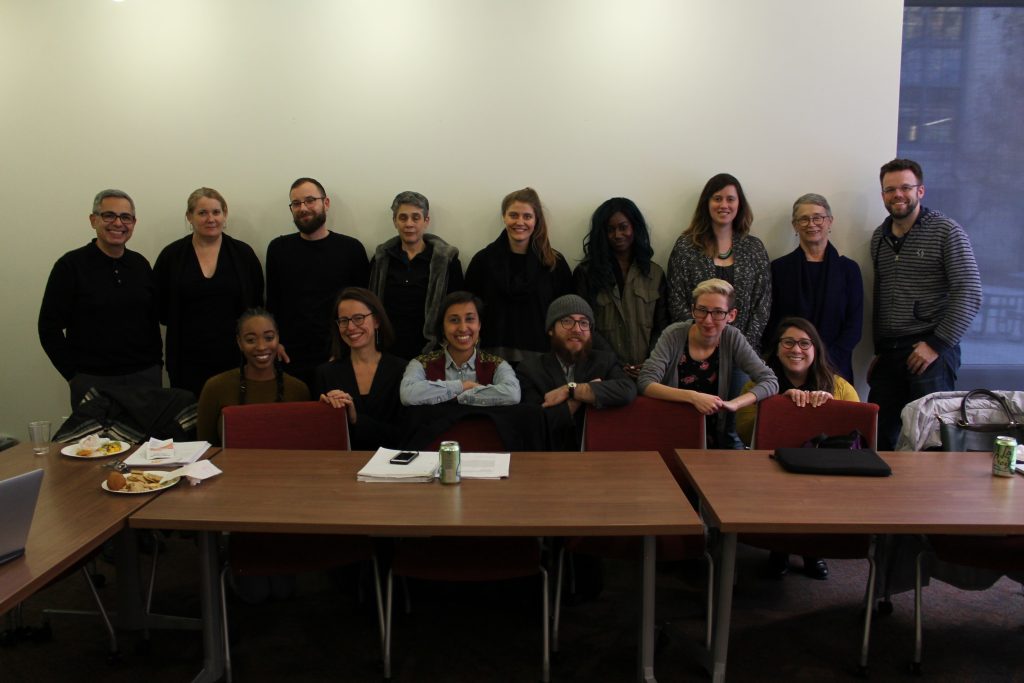
The 2018 SPAN Reading Group
Winter 2018: “‘Female Sexualities’: Between Feminist Theory and Sexuality Studies”
Coordinator: Amy Partridge
Session 1
- Gayle Rubin, “Thinking Sex: Notes for a Radical Theory of the Politics of Sexuality” (1984)
- Catharine A. MacKinnon, “Sexuality” (1989)
- Hortense J. Spillers, “Interstices: A Small Drama of Words” (1984)
- [Recommended] Gayle Rubin, “The Traffic In Women: Notes of the ‘Political Economy’ of Sex” (1975)
- [Recommended] Catharine A. MacKinnon, “Desire & Power” (1983)
Session 2
- Radicalesbians, “The Woman-Identified Woman” (1970)
- Adrienne Rich, “Compulsory Heterosexuality & Lesbian Existence” (1983) in Powers of Desire
- Amber Hollibaugh & Cherrie Moraga, “What We’re Rolling Around in Bed With: Sexual Silences in Feminism: A Conversation toward Ending Them” (1981) in Heresies
- Joan Nestle, “Butch-Femme Relationships: Sexual Courage in the 1950s” (1981) in Heresies
- Ann Cvetkovich, “Trauma and Touch: Butch-Femme Sexualities” (2003) in An Archive of Feelings: Trauma, Sexuality, and Lesbian Public Cultures
- Juana Maria Rodriquez, “Gesture in Mambo Time” (2014) in Sexual Futures, Queer Gesture and Other Latina Longings
- [Recommended] Sara Ahmed, “Lesbian Feminism” (2017) in Living a Feminist Life
Session 3
- Anne Koedt, “The Myth Of The Vaginal Orgasm” (1970) in Notes From the Second Year
- Lynn Comella, “The Business of Masturbation” (2017) in Vibrator Nation: How Feminist Sex-Toy Stores Changed the Business of Pleasure
- Amber Jamilla Musser, “On the orgasm of the species: female sexuality, science and sexual difference” (2012) in Feminist Review
- Lisa D. Wade, Emily C. Kremer & Jessica Brown, “The Incidental Orgasm: The Presence of Clitoral Knowledge and the Absence of Orgasm for Women” (2008) in Women & Health
- Annamarie Jagose, “Counterfeit pleasures fake orgasm and queer agency” (2010) in Textual Practice
- Robyn Wiegman, “What Orgasmology Teaches Us About Sex: A Dossier on Anne Marie Jagose’s Orgasmology” (2016) in Feminist Formations
- [Recommended] Annamarie Jagose, “Orgasm and Queer Studies: The Madness In Method” (2016) in Feminist Formations
Session 4
- Alexandra Brodsky & Elizabeth Deutsch, “The Promise of Title IX: Sexual Violence & the Law” (2015) in Dissent
- Jane E. Larson, “Sexual Labor” (2004) in Directions in Sexual Harassment Law
- Adrienne Davis, “Slavery & the Roots of Sexual Harrassment” (2004) in Directions in Sexual Harassment Law
- Ann J. Cahill, “Recognition, Desire & Unjust Sex” (2014) in Hypatia
- Robin West, “Consensual Sexual Dysphoria: A Challenge for Campus Life” (2017) in Journal of Legal Education
- Janet Halley, “The Move To Affirmative Consent” (2016) in Signs
- Zine: “Learning Good Consent,” Doris Distro Press
- Zine: The Chrysalis Collective, “Beautiful, Difficult, Powerful: Ending Sexual Assault Through Transformative Justice”
- Zine: “We are all survivors, We are all perpetrators,” Sprout Distro
- [RECOMMENDED/FOUNDATIONAL] Kimberle Crenshaw, “Mapping the Margins: Intersectionality, Identity Politics, and Violence Against Women of Color” (1993) in Stanford Law Review
Session 5
- Carol Vance, “Pleasure & Danger: Towards a Politics of Female Sexuality” (1984) in Pleasure & Danger: Exploring Female Sexuality
- Margo Weiss, “Working at Play: BDSM In the San Francisco Bay Area” (2006) in Anthropologica 48:2
- Mireille Miller-Young, “Hip-Hop Honeys and Da Hustlaz: Black Sexualities in the New Hip-Hop Pornography” (2008) Meridians 8:1
- Deborah Tolman, “Female Adolescents, Sexual Empowerment and Desire: A Missing Discourse of Gender Inequity” (2012) in Sex Roles
- Amy Adele Hasinoff, “Blaming Sexualization for Sexting” (2014) in Girlhood Studies 7:1
- [Recommended] Pat Califia, “Feminism and Sadomasochism”(1980) in Public Sex: The Culture of Radical Sex
- [Recommended] S/M Erotica Sampler: “Proper Orgy Behavior”; “A Bedtime Story”; “Act II Scene I”; “Coming Out”; “How I Learned to Stop Worrying and Love My Dildo” in Coming to Power (1981)
- [Recommended] Gayle Rubin, “The Leather Menace: Comments on Politics and S/M” (1981) in Coming to Power
- [Recommended] The Feminist Porn Book: The Politics of Producing Pleasure (2013) eds. Tristan Taormino, : “Introduction: The Politics of Producing Pleasure”; Mureille Miller-Young “Interventions: The Deviant and Defiant Art of Black Women Porn Directors”
- [Recommended] Melinda Chateauvert, “‘My Ass is Mine!’ Call off Your Old Tired Ethics” (2014) in Sex Workers Unite: A History of the Movement from Stonewall to SlutWalk
- [Recommended] Lorena Garcia, “The Sexual (Mis)-Education of Latina Girls” (2012) in Respect Yourself, Protect Yourself: Latina Girls and Sexual Identity
participants
| Dominique Adams-Romena | Graduate Student | Sociology |
| Rhiannon Auriemma | Graduate Student | Political Science |
| Ivan Bujan | Graduate Student | Performance Studies |
| Hector Carrillo | Faculty | Sociology/ Gender & Sexuality Studies |
| Nick Davis | Faculty | English/ Gender & Sexuality Studies |
| Misty De Berry | Graduate Student | Performance Studies |
| Steve Epstein | Faculty | Sociology/ Humanities |
| Tay Glover | Graduate Student | African American Studies |
| Moira Kyweluk | Graduate Student |
Anthropology/ Public Health |
| Marie Laperriere | Graduate Student | Sociology |
| AJ Lewis | Postdoc | History/ Gender & Sexuality Studies |
| Christina LoTempio | Graduate Student | Political Science |
| Alyssa Lynne | Graduate Student | Sociology |
| Erin Moore | Postdoc | Buffett Institute |
| Jennifer Nash | Faculty | African American Studies/ Gender & Sexuality Studies |
| Amy Partridge | Faculty | Gender & Sexuality Studies |
| Jan Radway | Faculty | Communication Studies/ Gender & Sexuality Studies |
| Jackie Stevens | Faculty | Political Science/ Legal Studies |
| Mitali Thakor | Postdoc | Anthropology/ Gender & Sexuality Studies |
| Helen Thompson | Faculty | English |
| Cinnamon Williams | Graduate Student | African American Studies |
| Paola Zamperini | Faculty | Asian Languages and Cultures |
photos
Winter 2017: “Thinking with Difference: Critical Race Theories of/and the Erotic”
Coordinators: Amy Partridge and Aaron Norton
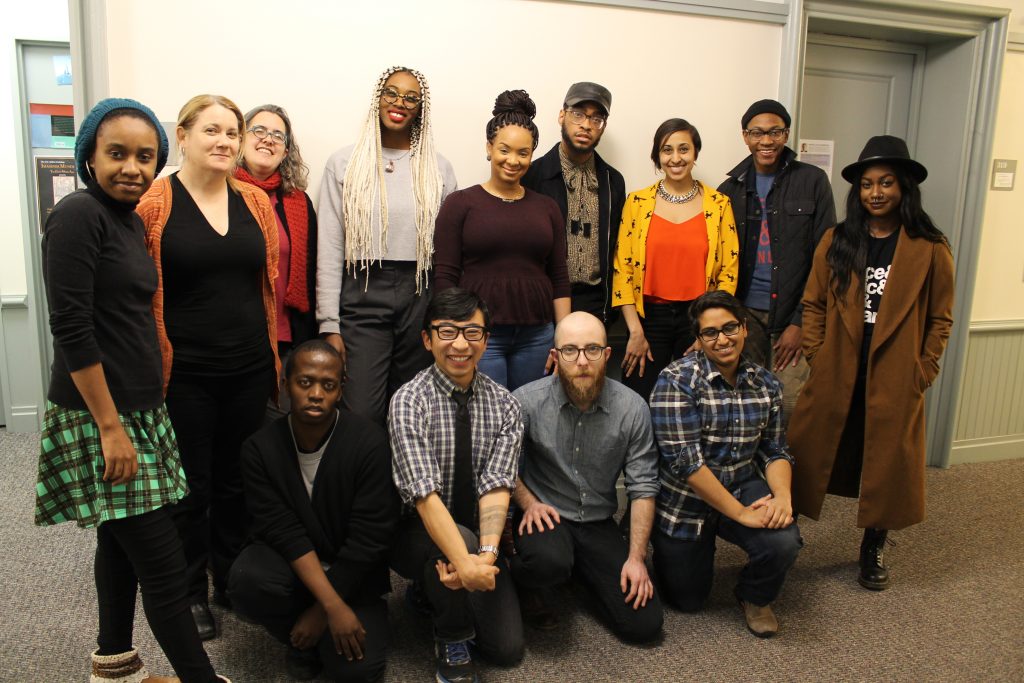
Session 1
- Hortense Spillers, “Interstices: A Small Drama of Words” in Pleasure & Danger: Exploring Female Sexuality, ed. Carole Vance (1984).
- Hortense Spillers, “Mama’s Baby, Papa’s Maybe: An American Grammar Book” Diacritics Vol.17 No. 2 (Summer, 1987).
- Spillers et al, “Whatcha Gonna Do? Revisiting ‘Mama’s Baby, Papa’s Maybe: An American Grammar Book”–A Conversation with Hortense Spillers, Saidiya Hartman, Farah Jasmine Griffin, Shelley Eversley & Jennifer L. Morgan Women Studies Quarterly, Spring 2007.
- Roderick A. Ferguson, Aberrations in Black (2004)–Introduction, Chapter 4, and Conclusion.
- Juana Maria Rodriguez, “Queer Sociality and Other Sexual Fantasies” GLQ 17:2-3 (2011).
Session 2
- Saidiya Hartman, Scenes of Subjection: Terror, Slavery, and Self-Making In 19th Century America (1997)–Intro & Ch. 3.
- Sharpe et al, Monstrous Intimacies: Making Post-Slavery Subjects. Durham, NC: Duke (2010)–Intro. & Ch.3
- — “The Attendant” by Isaac Julien (1993). http://ubu.com/film/julien_attendant.html
- Vincent Woodard, The Delectable Negro: Human Consumption and Homoeroticism Within US Slave Culture NYU (2014)—Intro, Ch. 5, and Ch. 6.
- Omise’eke Natasha Tinsley, “Black Atlantic, Queer Atlantic: Queer Imaginings of the Middle Passage” GLQ: A Journal of Lesbian and Gay Studies, 2008, Vol.14(2).
Session 3
- Audre Lorde, “Uses of the Erotic: The Erotic as Power” (1978) in Sister Outsider.
- Darieck Scott, Extravagant Abjection (2010)–“Introduction: Blackness, Abjection & Sexuality” & “Notes on Black (Power) Bottoms.”
- Juana Maria Rodriguez, Sexual Futures, Queer Gestures & Other Latina Longings (2014)—Introduction, Ch. 4 “Latina Sexual Fantasies, The Remix,” & “The Afterglow.”
- Amber Jamilla Musser, Sensational Flesh: Race, Power & Masochism (2014)—“Introduction: Theory, Flesh, Practice” & “Conclusion: Making Flesh Matter.”
- L.H. Stallings, Funk the Erotic: Transaesthetics and Black Sexual Cultures (2015) –Introduction & Chs. 3 “‘Make Ya Holler You’ve Had Enough’: Neutralizing Masculine Privilege with BDSM and Sex Work”
Session 4
- Evelynn Hammonds, “Black (W)holes and the Geometry of Black Female Sexuality” differences: A Journal of Feminist Theory 6 nos 2-3 (1994).
- Evelynn Hammonds, “Towards a Geneology of Black Female Sexuality: The Problematic of Silence” reprinted in Feminist Theory & The Body (1997).
- Jennifer Nash, “Strange Bedfellows: Black Feminism & Antipornography Feminism” Social Text 97 (Winter 2008).
- Ariane Cruz, The Color of Kink: Black Women, BDSM and Pornography (2016)–Introduction & Ch 2.
- L.H. Stallings, Funk the Erotic: Transaesthetics and Black Sexual Cultures (2015)–Ch. 2, 4, & 6.
Session 5
- Bassichis, Morgan & Dean Spade, “Queer politics & anti-blackness” in Queer Necropolitics (Routledge, 2014) (13pp).
- Stanley, Spade, Queer (In)Justice, “Queering Prison Abolition, Now?” American Quarterly 64:1 (March 2012) (13pp).
- Richie, Beth. “Queering Anti-prison Work: African American Lesbians in the Juvenile Justice System” in Global Lockdown: Race, Gender & the Prison-Industrial-Complex (Routledge, 2005) (11pp).
- Cohen, Cathy, “Death and Rebirth of a Movement: Queering Critical Ethnic Studies” Social Justice 37:4 Special Issue: Community Accountability: Emerging Movements to Transform Violence (2011-12) (7pp).
- Ferguson, Roderick, “Of Our Normative Strivings: African-American Studies & the Histories of Sexuality” Social Text 23:3-4 (2005) (14pp).
- Hartman, Saidiya “Comments From the Field: The Belly of the World: A Note on Black Women’s Labors” Souls 18:1 (2016) (6pp).
- Edwards, Erica “Sex After the Black Normal,” Differences 26:1 (2015) (22pp).
participants
| V Chaudhry | Graduate Student | Anthropology |
| Morgan Clark | Graduate Student | Sociology |
| Chelsea Frazier | Graduate Student | African American Studies |
| Julian Glover | Graduate Student | African American Studies |
| Tay Glover | Graduate Student | African American Studies |
| Leslie Harris | Faculty | History |
| Douglas Ishii | Faculty | Asian American Studies |
| AJ Lewis | Faculty | History and Gender & Sexuality Studies |
| Patricia Nguyen | Graduate Student | Performance Studies |
| Aaron Norton | Faculty | Sociology and Gender & Sexuality Studies |
| Amy Partridge | Faculty | Gender & Sexuality Studies |
| Kenneth Pass | Graduate Student | Sociology |
| Shoniqua Roach | Graduate Student | Performance Studies |
| Mitali Thakor | Faculty | Anthropology and Gender & Sexuality Studies |
| Mary Weismantel | Faculty | Anthropology |
| Mlondolozi Zondi | Graduate Student | Performance Studies |
| Rebecca Zorach | Faculty | Art History |
photos
Winter 2016: “Pleasure/Danger: An Interdisciplinary Exploration of Sexual Pleasure and Sexual Risk.”
Coordinators: Amy Partridge, Judy Moskowitz, and Aaron Norton
Session 1
- Barucco, R. (2014). Beyond “poz” and “neg”: five HIV statuses, plus a new one. Huffington Post.
- Calabrese, Sarah K, and Kristen Underhill. 2015. “How Stigma Surrounding the Use of HIV Preexposure Prophylaxis Undermines Prevention and Pleasure: A Call to Destigmatize “Truvada Whores”.” American Journal of Public Health 105(10):1960-64.
- Curran, J.W. & Crosby, R.A. (2013). Pre-Exposure Prophylaxis for HIV: Who will benefit and what are the challenges? American Journal of Preventive Medicine, 44 (1S2): S163-S166.
- Dean, Tim. 2015. “Mediated intimacies: Raw sex, Truvada, and the biopolitics of chemoprophylaxis.” Sexualities 18(1-2): 224-46.
- Duran, D. (2012). Truvada whores. Huffington Post Gay Voices.
- Marcus, J. L., Glidden, D. V., Mayer, K. H., Liu, A. Y., Buchbinder, S. P., Amico, K. R., … & Grant, R. M. (2013). No evidence of sexual risk compensation in the iPrEx trial of daily oral HIV preexposure prophylaxis.
- Myers, J. E., & Sepkowitz, K. A. (2013). A pill for HIV prevention: Deja Vu all over again?. Clinical infectious diseases, 56(11), 1604-1612.
- Van der Straten, A., Stadler, J., Luecke, E., Laborde, N., Hartmann, M., Montgomery, E. T., & VOICE-C Study Team. (2014). Perspectives on use of oral and vaginal antiretrovirals for HIV prevention: the VOICE-C qualitative study in Johannesburg, South Africa. Journal of the International AIDS Society, 17(3Suppl 2).
- Volk, J. E., Marcus, J. L., Phengrasamy, T., Blechinger, D., Nguyen, D. P., Follansbee, S., & Hare, C. B. (2015). No new HIV infections with increasing use of HIV preexposure prophylaxis in a clinical practice setting. Clinical Infectious Diseases, 61(10), 1601-1603.
- Watney, Simon. 2013. “Reimagining Hope: An Interview with Simon Watney.” in Huffington Post
Session 2
- Audre Lorde, “Uses of the Erotic” (1978)
- Marshall, Wende Elizabeth. “AIDS, Race and the Limits of Science.” Social Science & Medicine Vol. 60, no. 11 (2005): 2515-2525.
- Montgomery, Catherine. “Making Prevention Public the co-production of gender and technology in HIV research” Social Studies of Science 42:6 (2012): 922-944.
- Mamo, Laura and Steven Epstein, 2014. “The Pharmaceuticalization of Sexual Risk: Vaccine Development and the New Politics of Cancer Prevention.” Social Science & Medicine 101. Elsevier. 155-165.
- Preciado, Beatriz. “Pharmaco-pornographic Politics: Towards a New Gender Economy.” Parallax Vol. 14, No. 1 (2008): 105-117.
- Race, Kane. “The Use of Pleasure in Harm Reduction: Perspectives from the History of Sexuality.” International Journal of Drug Policy 19, no. 5 (2008): 417-23.
- Race, Kane. (2016). Reluctant objects: sexual pleasure as a problem of HIV biomedical prevention. GLQ: A Journal of Lesbian and Gay Studies, 22(1), 1-31
Session 3
- Bell, Kirsten. 2005. “Genital cutting and Western discourses on sexuality.” Medical Anthropology Quarterly 19(2):125-48.
- Bell, Kirsten. 2015. “HIV prevention: Making male circumcision the ‘right’ tool for the job.” Global Public Health 10(5-6):552-72.
- Carpenter, Laura M, and Heather Hensman Kettrey. 2015. “(Im)perishable Pleasure, (In)destructible Desire: Sexual Themes in US and English News Coverage of Male Circumcision and Female Genital Cutting.” The Journal of Sex Research 52(8):841-56.
- Darby, R., and J.S. Svoboda. 2007. “A rose by any other name? Rethinking the similarities and differences between male and female genital cutting.” Medical Anthropology Quarterly 21(3):301-23.
- Giami, A. and Perry, C. 2012. Transformations in the medicalization of sex: HIV prevention between discipline and biopolitics. The Journal of Sex Research, 49(4), 353-361.
- Svoboda, J Steven. 2013. “Promoting genital autonomy by exploring commonalities between male, female, intersex, and cosmetic female genital cutting.” Global Discourse 3(2):237-55.
- Reply to Svoboda: Johnsdotter, Sara. 2013. “Discourses on sexual pleasure after genital modifications: The fallacy of genital determinism (a response to J. Steven Svoboda).” Global Discourse 3(2):256-65.
Session 4
- Bhattacharya, Shaoni. 2015. “Swipe and Burn.” New Scientist 225(3002):30–33
- AIDS Healthcare Foundation. 2015. “New AHF Billboard Campaign Addresses STD Risks From Popular Dating Apps, September 18.” http://www.aidshealth.org/#/archives/23468
- Kaplan, “Billboards linking Tinder to STDs are latest battleground in online dating wars” Washington Post Blogs 29 Sept. 2015
- Brait, Ellen. 2015. “Tinder and Grindr Outraged over STD Testing Billboards That Reference Apps.” The Guardian, September 29.”
- Holloway, Ian W., Craig A. Pulsipher, Jeremy Gibbs, Anamika Barman-Adhikari, and Eric Rice. 2015. “Network Influences on the Sexual Risk Behaviors of Gay, Bisexual and Other Men Who Have Sex with Men Using Geosocial Networking Applications.” AIDS and Behavior 19 Suppl 2:112–22.
- Che et al., 2015 “The Relationship Between Online Social Network Use, Sexual Risk Behaviors, and HIV Sero-Status Among a Sample of Predominately African American and Latino Men Who Have Sex With Men (MSM) Social Media Users” AIDS and Behavior 19 Suppl 2:98-105
- Muessig et al, “A Systematic Review of Recent Smartphones, Internet and Web 2.0 Interventions to Address the HIV Continuum of Care” AIDS and Behavior 19 Suppl 2:173-190.
- Race, Kane. 2015. “Speculative pragmatism and intimate arrangements: online hook-up devices in gay life.” Culture, health & sexuality 17(4):496-511.
- Race, Kane, 2015. “‘Party & Play’: Online hook-up devices and the emergence of PNP practices among gay men. Sexualities 18(3): 253-275.
- Sales, “Tinder and the Dawn of the ‘Dating Apocalypse’” Vanity Fair Aug. 6, 2015.
Session 5
- Escoffier, Jeffrey. “The Invention of Safer Sex: Vernacular Knowledge, Gay Politics and HIV Prevention.” Berkeley Journal of Sociology 43 (1998): 1-30.
- Crimp, Douglas. “How to Have Promiscuity in an Epidemic.” October 43 (1987): 237-71.
- Allen, Louisa. “‘They Think You Shouldn’t be Having Sex Anyway’: Young People’s Suggestions for Improving Sexuality Education Content.” Sexualities 11.5 (2008): 573-594.
- Lamb, Sharon, Kara Lustig, and Kelly Graling. “The Use and Misuse of Pleasure in Sex Education Curricula.” Sex Education 13.3 (2013): 305-318.
- Fine, Michelle, and Sara I. McClelland. “Sexuality Education and Desire: Still Missing after All These Years.” Harvard Educational Review 76.3 (2006): 297-338.
participants
| Erin Andrews | Graduate Student | English Northwestern University |
| Sarah Bassett | Graduate Student | Health Sciences Integrated Program Northwestern University |
| Alida Bouris | Faculty | School of Social Service Administration University of Chicago |
| Ivan Bujan | Graduate Student | Performance Studies Northwestern University |
| Héctor Carrillo | Faculty | Sociology and Gender & Sexuality Studies Northwestern University |
| Steven Epstein | Faculty | Sociology and Humanities Northwestern University |
| Brian Feinstein | Postdoctoral Scholar | Medical Social Sciences Northwestern University |
| Francesca Gaiba | Faculty | Institute for Sexual and Gender Minority Health and Wellbeing Northwestern University |
| Eddie Gamboa | Graduate Student | Performance Studies Northwestern University |
| Kai M Green | Faculty | African American Studies and Gender & Sexuality Studies Northwestern University |
| Jane Hereth | Graduate Student | School of Social Service Administration University of Chicago |
| Brandon Hill | Faculty | Center for Interdisciplinary Inquiry and Innovation in Sexual and Reproductive Health (Ci3) University of Chicago |
| Ryan Mack | Graduate Student | Sociology Northwestern University |
| Stuart Michaels | Faculty | NORC University of Chicago |
| Judy Moskowitz | Faculty | Third Coast Center for AIDS Research Northwestern University |
| Brian Mustanski | Faculty | Institute for Sexual and Gender Minority Health and Wellbeing Northwestern University |
| Aaron Norton | Faculty | Sociology and Gender & Sexuality Studies Northwestern University |
| Amy Partridge | Faculty | Gender & Sexuality Studies Northwestern University |
| Ryan Stillwagon | Research Assistant | NORC University of Chicago |
| Gregory Ward | Faculty | Linguistics and Gender & Sexuality Studies Northwestern University |
| Guangshuo Yang | Graduate Student | History Northwestern University |
photos
Winter 2015: “Sexual Violence/ Assault and the Problem of ‘Consent'”
Coordinator: Amy Partridge
Session 1
- Anonymous, “Dear Harvard: You Win.” In the Harvard Crimson.
- Armstrong, Elizabeth et al. 2006. “Sexual Assault on Campus: A Multilevel Integrative Approach to Party Rape.” Social Problems 53, No. 4, 483-499.
- Bogdanovich, Walter. 2014. “Reporting Rape, and Wishing She Hadn’t: How One College Handled a Sexual Assault Complaint.” The New York Times.
- California Senate Bill No. 957 Student Safety: Sexual Assault.
- CDC Division on Violence Prevention. 2014. “Preventing Sexual Violence on College Campuses: Lessons from Research and Practice “Part One: Evidence-Based Strategies for the Primary Prevention of Sexual Violence Prevention.” 1-8.
- DOE Office of Civil Rights. 2011. “Dear Colleague Letter/Sexual Violence.”
- Fassin, Eric. 1995. “Playing by the Antioch Rules,” in Debating Sexual Correctness.
- Garcia, Justin R. et al. 2012. “Sexual Hookup Culture,” Review of General Psychology 16, no. 2, 161-176.
- Grigoriadis, Vanessa. 2014. “Meet the College Women Who Are Starting a Revolution Against Campus Sexual Assault.” New York Times Magazine.
- Rosin, Hanna. 2012. “Boys on the Side.” The Atlantic.
- Rubin, David. 2013. “Do I Need a Contract to Kiss You?”: Consent, Incapacitation, and the Ethics of Sex” Palimpsest 2, No. 1, 99-105.
- “Not Alone: The First Report of the White House Task Force to Protect Students from Sexual Assault.” 2014. 2-5.
- “Not Alone, linked in Climate Surveys: Useful Tools to Help Colleges and Universities in Their Efforts to Reduce and Prevent Sexual Assault” (no publication information); “Chapter 2: Promising Practice Examples for a Campus Climate Survey.” 19-35.
Session 2
- Franke, Katherine. 2001. “Theorizing Yes: An Essay on Feminism, Law, and Desire” Columbia Law Review 101, No. 1, 181-208.
- Gruber, Aya. “Sex Assault Group Exercise.”
- Halley, Janet. 2003. “Sexuality Harassment.” In Directions in Sexual Harassment Law.
- MacKinnon, Catherine. 1989. “Rape: On Coercion and Consent.” In Toward a Feminist Theory of the State.
- West, Robin. 2009. “Sex, Law and Consent” in Ethics of Consent: Theory & Practice.
Session 3
- Bauer, Robin. 2014. “Negotiating Critical Consent.” In Queer BDSM Intimacies.
- Burk, Connie. 1999. “Think, Re-Think: woman-to-woman domestic violence,” accessed from The Northwest Network (originally published for The Wisconsin Coalition Against Domestic Violence).
- CDC, The National Intimate and Sexual Violence Survey (NISVS): An Overview of 2010 Findings on Victimization by Sexual Orientation.
- DOJ Office on Violence Against Women. 2014. “Celebrating LGBT Pride Month,” press release.
- Duggan, Lisa. 2014. “On Trauma and Trigger Warnings in Three Parts.” Bullybloggers.
- Edwards, Katie and Sylaska, Kateryna. 2013. “The Perpetration of Intimate Partner Violence among LGBTQ College Youth: The Role of Minority Stress” Journal of Youth Adolescence 42, 1721-1731.
- Halberstam, Jack. 1993. “Imagined Violence/Queer Violence: Representation, Rage & Resistance” Social Text 37, 187-201.
- Perez, Zenen et al. 2014. “A Hidden Crisis: Including the LGBT Community When Addressing Sexual Violence on College Campuses.”
- Roberts, Andrea et al. 2012. “Childhood Gender Nonconformity: A Risk Indicator for Childhood Abuse and Posttraumatic Stress in Youth” Pediatrics 129, No. 3, 410-417.
Session 4
- Corrigan, Rose. 2013. Chapters 7 and 8. In Up Against a Wall: Rape Reform and the Failure of Success.
- Critical Resistance-Incite!. 2003. “Statement on Gender Violence and the Prison-Industrial-Complex” Social Justice 30, No. 3 (93), 141-150.
- Davis, Angela. “Rape, Racism, and the Myth of the Black Rapist.” In Women, Race &
- Class.
- Gottschalk, Marie. 2006. “Not the Usual Suspects: Feminist, Women’s Groups and the Anti-Rape Movement.” In The Prison and the Gallows: The Politics of Mass Incarceration in America.
- Infante, Chad. Louise Erdrich’s The Round House, A synopsis.
- Jackson, Jesse Lee. 2013. “Sexual Necropolitics and Prison Rape Elimination” Signs 39, no. 1.
- “Reproductive Justice & the Criminalization of Black Women: Some Remarks” from Prison Culture Jan. 27, 2014.
- Smith, Andrea & Ross, Luana. 2004. “Introduction: Native Women & State Violence” Social Justice 31, No. 4 (98), 1-7.
- Smith, Andrea. 2011-12. “Decolonizing Anti-Rape Law and Strategizing Accountability in Native American Communities” Social Justice 37, No. 4 (122), 36-43.
Session 5
- Halley, Janet E. 2008.”Rape in Berlin: Reconsidering the Criminalisation of Rape in the International Law of Armed Conflict,” Melbourne Journal of International Law 9, No. 1.
- Halley, Janet. 2008-9. “Rape at Rome: Feminist Interventions in the Criminalization of Sex-Violence in Positive Internatinal Law.” Michigan Journal of International Law 30, No. 1.
- Engle, Karen. 2005. “Feminism and Its (Dis)contents: Criminalizing Wartime Rape in Bosnia and Herzegovina” The American Journal of International Law 99, No. 4.
- MacKinnon, Catherine. 2013. “Creating International Law: Gender as Leading Edge.” Harvard Journal of Law & Gender 36, No. 1, 105-21.
- Miller, Ruth A. 2007. “Sexuality and Citizenship Formation.” In Limits of Bodily Integrity: Abortion, Adultery and Rape Legislation in Comparative Perspective.
- Ticktin, Miriam. 2004. “Sexual Violence as the Language of Border Control: Where French Feminist and Anti-Immigrant Rhetoric Meet” Signs 33, No. 4, 863-889.
- Ticktin, Miriam. 2011. “The Gendered Human of Humanitarianism: Medicalizing and Politicizing Sexual Violence” Gender and History 23, No. 2, 250-265.
- Theidon, Kimberly. 2007. “Gender in Transition: Common Sense, Women and War.” Journal of Human Rights, Vol. 6, No. 4, 453-478.
participants
| Penelope Deutscher | Faculty | Philosophy/ Critical Theory Cluster |
| Claudia Garcia-Rojas | Graduate Student | African American Studies |
| Leigh Goldstein | Graduate Student | RTVF/ Screen Cultures and Gender & Sexuality Studies |
| Kai M Green | Faculty | African American Studies and Gender & Sexuality Studies |
| Eszter Hargittai | Faculty | Communication Studies |
| Yael Israel-Cohen | Faculty | Jewish and Israel Studies |
| Chad Infante | Graduate Student | English |
| Assata Kokayi | Graduate Student | African American Studies |
| Marie Laperriere | Graduate Student | Sociology |
| Jaimie Morse | Graduate Student | Sociology |
| Aaron Norton | Faculty | Sociology and Gender & Sexuality Studies |
| Anna Parkinson | Faculty | German and Gender & Sexuality Studies |
| Amy Partridge | Faculty | Gender & Sexuality Studies |
| Jan Radway | Faculty | Communication Studies and Gender & Sexuality Studies |
| Jacqueline Stevens | Faculty | Political Science |
| Leila Tayeb | Graduate Student | Performance Studies |
| Deborah Tuerkheimer | Faculty | Law |
| Gregory Ward | Faculty | Linguistics and Gender & Sexuality Studies |
photos
Winter 2014: “Sex, Sexuality, and (Techno)Science”
Coordinator: Amy Partridge
Session 1
- Fausto-Sterling, Anne. 2000. “Dueling Dualisms.” In Sexing the Body: Gender Politics and the Construction of Sexuality.
- Fausto-Sterling, Anne. 2000. “The Rodent’s Tale.” In Sexing the Body: Gender Politics and the Construction of Sexuality.
- Fausto-Sterling, Anne. 2000. “Gender Systems: Toward a Theory of Human Sexuality.” In Sexing the Body: Gender Politics and the Construction of Sexuality.
- O’Riordan, Kate. 2012. “The Life of the Gay Gene: From Hypothetical Genetic Marker to Social Reality.” Journal of Sex Research 49, No. 4, 362-368.
Session 2
- Murphy, Michelle. 2012. “Introduction: Feminism in/as Biopolitics.” In Seizing the Means of Reproduction: Entanglements of Feminism, Health, and Technoscience.
- Murphy, Michelle. 2012. “Traveling Technology and a Device for Not Performing Abortions.” In Seizing the Means of Reproduction: Entanglements of Feminism, Health, and Technoscience.
- Murphy, Michelle. 2012. “Conclusion: Living the Contradiction.” In Seizing the Means of Reproduction: Entanglements of Feminism, Health, and Technoscience.
- Roberts, Dorothy E. 2009. “Race, Gender, and Genetic Technologies: A New Reproductive Dystopia?” Signs 34 No. 4, 783-804.
- Wiegman, Robyn. 2002. Intimate Publics: Race, Property, and Personhood.” American Literature 74 No. 4, 859-885.
Session 3
- Daniels, Cynthia. 2006. “Introduction.” In Exposing Men: The Science and Politics of Male Reproduction.
- Daniels, Cynthia. 2006. “Commodifying Men: The Science and Politics of Male Infertility and Sperm Banking.” In Exposing Men: The Science and Politics of Male Reproduction.
- Mamo, Laura. 2007. “Going High-Tech: Infertility Expertise and Lesbian Reproductive Practices.” In Queering Reproduction: Achieving Pregnancy in the Age of Technoscience.
- Mamo, Laura. 2007. “Imagining Futures of Belonging.” In Queering Reproduction: Achieving Pregnancy in the Age of Technoscience.
- Stacey, Jackie. 2010. “Introduction: Technologies of Imitation and the Genetic Imaginary.” In The Cinematic Life of the Gene.
- Stacey, Jackie. 2010. “The Uncanny Architectures of Intimacy in Code 46.” In The Cinematic Life of the Gene.
Session 4
- Burfoot, Annette. 2003. “Human Remains: Identity Politics in the Face of Biotechnology.” Cultural Critique 53 No. 1, 47-71.
- Cooper, Melinda and Waldby, Catherine. 2010. “From Reproductive Work to Regenerative Labor: The Female Body and the Stem Cell Industries.” Feminist Theories 11 No. 1, 3-22.
- Haraway, Donna. 2000. “A Cyborg Manifesto: Science, Technology, and Socialist-Feminism in the Late Twentieth Century.” In The Cybercultures Reader.
- Miyake, Esperanza. 2013. “My, Is That Cyborg a Little Bit Queer?.” Journal of International Women’s Studies 5 No. 2, 53-61.
- Puar, Jasbir. 2012. “I Would Rather be a Cyborg Than a Goddess. Becoming Intersectional in Assemblage Theory.” philoSOPHIA. 2 No. 1, 49-66.
Session 5
- Beauchamp, Toby. 2013. “The Substance of Borders: Transgender Politics, Mobility, and U.S. State Regulation of Testosterone.” GLQ 19 no. 1, 57-78.
- Kafer, Alison. 2013. “Introduction.” In Feminist Queer Crip.
- Kafer, Alison. 2013. “The Cyborg and the Crip: Critical Encounters.” In Feminist Queer Crip.
- Spade, Dean. 2006. “Mutilating Gender.” In The Transgender Studies Reader.
- Stone, Sandy. 1993. “The Empire Strikes Back: A Posttransexual Manifesto.”
participants
| Héctor Carrillo | Faculty | Sociology |
| Cecilio Cooper | Graduate Student | African American Studies |
| Nick Davis | Faculty | English and Gender & Sexuality Studies |
| Mary Dietz | Faculty | Political Science and Gender & Sexuality Studies |
| Steve Epstein | Faculty | Sociology and the Humanities |
| Clare Forstie | Graduate Student | Sociology and Gender & Sexuality Studies Cluster |
| Eddie Gamboa | Graduate Student | Performance Studies |
| Kathryn Gigler | Graduate Student | Psychology |
| Kareem Khubchandani | Graduate Student | Performance Studies |
| Alex Lindgren-Gibson | Graduate Student | History |
| Ryan Mack | Graduate Student | Sociology |
| Amy Partridge | Faculty | Gender & Sexuality Studies |
| Anna Terwiel | Graduate Student | Political Science |
| Helen Thompson | Faculty | English |
| Stefan Vogler | Graduate Student | Sociology |
photos
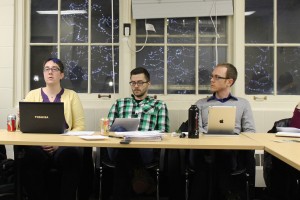 |
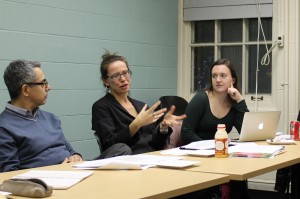 |
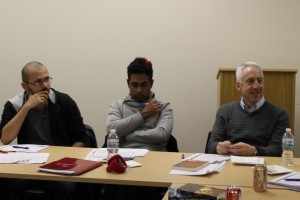 |
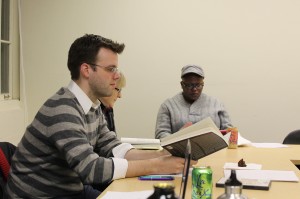 |
| Clare Forstie, Ryan Mack, and
Stefan Vogler |
Héctor Carrillo, Helen Thompson, and Alex Lindgren-Gibson |
Eddie Gamboa, Kareem Khubchandani, and Steve Epstein | Nick Davis, Mary Dietz, and
Cecilio Cooper |
Winter 2013: “The Politics and Promise of Feminist and Queer Activism”
Coordinator: Kasey Evans
Session 1
- Wiegman, Robyn. 2012. Selections from Object Lessons.
- Grewal, Inderpal. 2005. Selections from Transnational America: Feminisms, Diasporas, Neoliberalisms.
- Ferguson, Roderick. 2012. Selections from The Reorder of Things.
Session 2
- Wald, Priscilla. 2008. Contagious: Cultures, Carriers, and the Outbreak Narrative.
Session 3
- Spade, Dean. 2011. Normal Life: Administrative Violence, Critical Trans Politics and the Limits of Law.
Session 4
- Herzog, Dagmar. 2011. Sexuality in Europe.
Session 5
- Jagose, Annamarie. 2012. Orgasmology.
participants
| Kasey Evans | Faculty | English |
| Leigh Goldstein | Graduate Student | Screen Cultures |
| Hayrunnisa Goksel | Graduate Student | Sociology |
| Eli Krell | Graduate Student | Performance Studies |
| Elizabeth Rodriguez | Graduate Student | English |
| Caroline Carlsmith | Graduate Student | Art Theory |
Winter 2012: “Sexuality and Vulnerability”
Coordinator: Amy Partridge
Session 1
- Mbembe, Achille. 2003. ”Necropolitics.” Pop Culture 15 No. 1, 11-40.
- Arán, Márcia and Carlos Augusto Peixoto Júnior. 2007. “Vulnerability and Bare Life: Bioethics and Biopolitics Today.” Rev. Saúde Pública 41 No. 5, 849-857.
- Comaroff, Jean. 2007.“Beyond Bare Life: AIDS, (Bio)Politics, and the Neoliberal Order.” In Morality, Hope, and Grief: Anthropologies of AIDS in Africa.
- Marie Smith, Anna. 2010. “Neo-eugenics: A Feminist Critique of Agamben.”
Session 2
- Sanchez, Lisa E. 2004. “The Global E-Rotic Subject, The Ban, And The Prostitute-Free Zone: Sex Work and the Theory of Differential Exclusion.” Environment and Planning D: Society and Space 22, 861-883.
- Spade, Dean. 2009. “Keynote Address: Trans Law & Politics on a Neoliberal Landscape.”
- Meiners, Erica R. 2009. “Never Innocent: Feminist Trouble with Sex Offender Registries and Protection in a Prison Nation.” Meridians: Feminism, Race, and Transnationalism 9 No. 2, 31-62.
Session 3
- Kornbluh, Felicia. 2011. “Queer Legal History: A Field Grows Up and
Comes Out.” Law and Social Inquiry 36 No. 2, 537-559. - Castiglia, Christopher and Christopher Reed. 2012. “Queer Theory Is Burning: Sexual Revolution and Traumatic Unremembering.” In If Memory Serves: Gay Men, AIDS, and the Promise of the Queer Past.
Session 4
- Shah, Nayan. 2011. “Introduction” and “Policing Strangers and Borderlands” In Stranger Intimacy: Contesting Race, Sexuality, And The Law in the North American West.
- Reddy, Chandan. 2011. “Rights-Based Freedom with Violence: Immigration, Sexuality, and the Subject of Human Rights.” In Freedom with Violence: Race, Sexuality, and the US State.
- Weston, Kath, 2008. “A Political Ecology of ‘Unnatural Offences’ State Security, Queer Embodiment, and the Environmental Impacts of Prison Migration.”
Session 5
- Deutscher, Penelope. 2012. “Foucault’s History of Sexuality, Volume I: Re-reading its Reproduction.” Theory, Culture & Sociey 29 No. 1, 119-137.
- Robinson, Keith.2003. “The Passion and the Pleasure Foucault’s Art of Not Being Oneself.” Theory, Culture & Society 20 No. 2, 119-144.
- Wentzell, Emily. 2011. “Marketing Silence, Public Health Stigma and the Discourse of Risky Gay Viagra Use in the US.” Body & Science 17 No. 4, 105-125.
participants
| Tera Agyepong | Graduate Student | African American Studies and Law |
| Savina Balasubramian | Graduate Student | Sociology |
| Andrew Brown | Graduate Student | Performance Studies |
| Héctor Carrillo | Faculty | Sociology and Gender & Sexuality Studies |
| Elizabeth Corzo-Duchardt | Graduate Student | Screen Cultures and RTVF |
| Jillana Enteen | Faculty | Gender & Sexuality Studies |
| Steven Epstein | Faculty | Sociology and the Humanities |
| Clare Forstie | Graduate Student | Sociology and Gender & Sexuality Studies Cluster |
| Bonnie Honig | Faculty | Political Science |
| Kirsten Leng | Faculty | History |
| Tessie Liu | Faculty | History |
| Gregory Mitchell | Graduate Student | Performance Studies |
| Cynthia Nazarian | Faculty | French and Italian |
| Amy Partridge | Faculty | Gender & Sexuality Studies |
| Melissa Minor Peters | Graduate Student | Anthropology |
| Sarah Rodriquez | Faculty | Medical Humanities and Bioethics |
| Evren Savci | Faculty | Sociology |
| Mary Weismantel | Faculty | Anthropology |
| Christine Wood | Graduate Student | Sociology |
Winter 2011: “Intersection of Sexuality Studies and Gender Studies”
Coordinator: Mary Weismantel
- Rubin, Gayle S. 1975. “The Traffic in Women: Notes on the ‘Political Economy’ of Sex.” In Toward an Anthropology of Women.
- Rubin, Gayle S. 1993. “Thinking Sex: Notes for a Radical Theory of the Politics of Sexuality.” In Lesbian and Gay Studies Reader.
- Rubin, Gayle S. 2010. “Blood under the Bridge: Reflections on ‘Thinking Sex.'”Journal of Lesbian and Gay Studies 17 No. 1, 15-48.
- Love, Heather. 2010. Introduction. GLQ 17, No. 1.
Session 2
- Anzaldúa, Gloria. 1999. “How to Tame a Wild Tongue.” In Borderlands/La Frontera: The New Mestiza.
- Anzaldúa, Gloria. 1999. “La herencia de Coatlicue/The Coatlicue State.” In Borderlands/La Frontera: The New Mestiza.
- Anzaldúa, Gloria. 1999. “The Homeland, Aztlán/El otro México.” In Borderlands/La Frontera: The New Mestiza.
- de Laurentis, Theresa. 2005. “When Lesbians Were Not Women.” In On Monique Wittig: Theoretical, Political, and Literary Essays.
- Segato, Rita Laura. 2010. “Territory, Sovereignty, and Crimes of the Second State: The Writing on the Body of Murdered Women.” In Terrorizing Women: Feminicide in the Americas.
- Wittig, Monique. 1981. “One Is Not Born a Woman.” In The Straight Mind and Other Essays.
- Wittig, Monique. 1980. “The Straight Mind.” In The Straight Mind and Other Essays.
- Wittig, Monique. 1973. Excepts. In The Lesbian Body.
- Wittig, Monique. 2005. “Some Remarks on The Lesbian Body.” In On Monique Wittig: Theoretical, Political, and Literary Essays
Session 3
- Halley, Janet. 2006. Split Decisions: How and Why to Take a Break from Feminism.
Session 4
- Chauncey, George. 1985. “Christian Brotherhood or Sexual Perversion? Homosexual Identities and the Construction of Sexual Boundaries in the World War One Era.” Journal of Social History 19 No. 2, 189-211.
- Martin, Biddy. 1994. “Sexualities without Genders and Other Queer Utopias.” Diacritics 24 No. 2/3
- Moore, Mignon R. 2006. “Lipstick or Timberlands? Meanings of Gender Presentation in Black Lesbian Communities.”
- Halperin, David M. 2004. “Historicizing the Subject of Desire.” In How to Do the History of Homosexuality.
Session 5
- Edelman, Lee. 2004. “The Future is Kid Stuff.” In No Future: Queer Theory and the Death Drive.
- Love, Heather. 2007. “Introduction” and “Epilogue.” In Feeling Backward: Loss and the Politics of Queer History.
- Noys, Benjamin. 2008. “`The End of the Monarchy of Sex.” Theory, Culture & Society 25 No. 5, 104-122.
- Zerilli, Linda M.G. 2008. “Feminists Know Not What They Do: Judith Butler’s Gender Trouble and the Limits of Epistemology.” In Judith Butler’s Precarious Politics: Critical Encounters.
participants
| Nicki Beisel | Faculty | Sociology |
| Virgil Brower | Graduate Student | Philosophy |
| Héctor Carrillo | Faculty | Sociology |
| Teri Chettiar | Graduate Student | English |
| Nicholas Davis | Faculty | English/ Gender & Sexuality Studies |
| Mary Dietz | Faculty | Political Science and Gender & Sexuality Studies |
| Steven Epstein | Faculty | Sociology and the Humanities |
| Hayrunnisa Goksel | Graduate Student | Sociology and Gender & Sexuality Studies Cluster |
| Jay Grossman | Faculty | English |
| Assata Kokayi | Graduate Student | African American Studies |
| Jeffrey Kosbie | Graduate Student | Sociology and Law |
| Ann Orloff | Faculty | Sociology and Gender & Sexuality Studies |
| Amy Partridge | Faculty | Gender & Sexuality Studies |
| Anna Terwiel | Graduate Student | Political Theory |
| Gregory Ward | Faculty | Linguistics |
| Mary Weismantel | Faculty | Anthropology |
photos
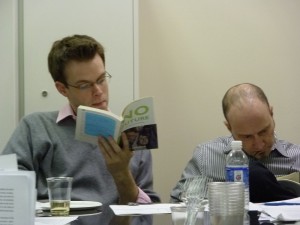 |
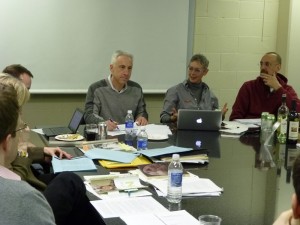 |
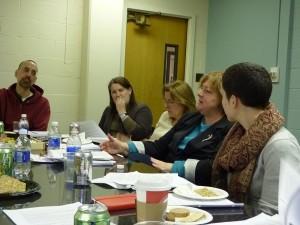 |
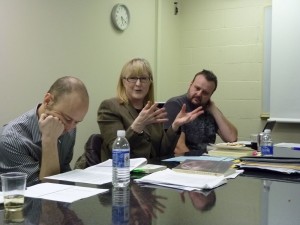 |
|
Nick Davis and Jay Grossman |
Steve Epstein, Mary Weismantel, and Gregory Ward
|
Gregory Ward, Amy Partridge, Nicki Beisel, Ann Orloff, and Anna Terwiel | Jay Grossman, Mary Dietz, and Virgil Brower |

